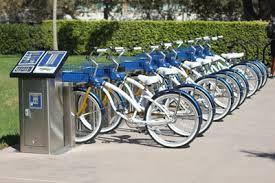My hometown of Temple, Georgia is very small. It is so small, in fact, that we have to go to other towns in order to do anything except get gas or go to McDonald’s. Most people I know spend a lot of their leisure and business time in the neighboring city of Carrollton.
Carrollton has a lot to offer for both people passing through and locals. There’s a movie theater, multiple restaurants and shopping centers, many churches, schools and the like. There’s even a state park with a lake for camping and fishing. In addition to the aforementioned list, they now have an 18-mile shared path for walking, running and biking that goes around the city called the Greenbelt and a bike sharing system.
The bike share is 100 percent sponsored by the local hospital, Tanner Hospital, the local large business, Southwire and the local university, the University of West Georgia. The bikes can be rented and returned at 10 stations throughout the city, and employees of Tanner and Southwire get the first hour they ride for free. UWG students also get their first hour free.
While Carrollton is larger than my actual hometown, it is only home to about 30,000 people. I’m curious how a city of that size can implement the bike sharing service and Baton Rouge, or even just the University, is behind on implementing the program.
Bike sharing isn’t a new idea. You can rent bikes to ride around New Orleans, and Auburn University has a bike sharing system of their own. I cannot say enough good things about having a bikeshare program available to us.
For example, if I want to go down to CC’s by Walk-Ons and get a coffee, I have to get in my car and pick my poison as to whether I want to sit in traffic on Highland or on Nicholson trying to get there. If there was a bike, I could just hop on and ride over there without sitting in traffic. This goes for many people in the same predicament who just want to travel close by.
It also fosters a healthier population because people might be more inclined to ride a bike than to sit in traffic. They also might take the bikes on a ride around the lakes. No matter what they’re doing or where they’re going, it is better than sitting in a car waiting on the light to change.
In a 2016 article by The Daily Reveille, Development Project Director Whitney Cooper of the Downtown Development District said the proposed bike sharing service in Baton Rouge should have been up and running by now, if not some time later this year.
The Environmental Protection Agency proposed the bike share as a solution to Baton Rouge’s obesity and traffic issues in September of 2015. The city put together an extensive report around the same time, and another report containing a plan was rolled out in August of 2016.
A Feb. 3 article from The Reveille stated that the Bikeshare is in plan mode and that the University expects to be rolling it out sometime this year.
I hate to be this way, but I’ll believe it when I see it. This has been talked about for a long time by a lot of people in power throughout the city. According to the estimates given in these materials, the bike share should be near completion, but it isn’t. In fact, I haven’t even heard of the beginning of the plan.
The benefits far outweigh any disadvantages to this program. The EPA basically said our city needs it, so I’m going to have to wait and see and hope that this can become a reality.
Myia Hambrick is a 21-year-old mass communication junior from Temple, Georgia.
Opinion: Bike share program coming to University, will bring positive effects
March 31, 2017

The University proposed a bike share plan in August 2016, but it has yet to be completed.




